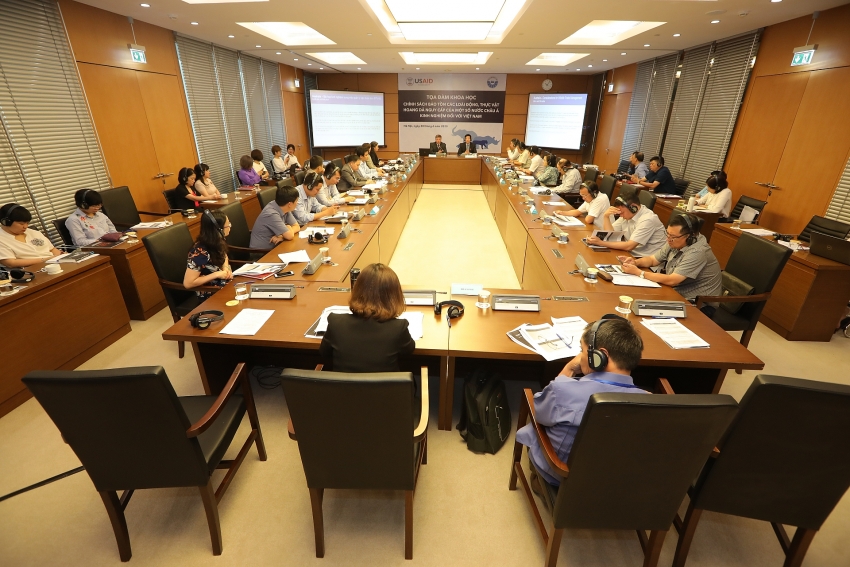High-level dialogue strengthening wildlife trafficking counter efforts
 |
| The high-level dialogue strengthening legislation and communications to reduce demandsfor illegal wildlife products |
The event is the second in a series of three dialogues organised by the USAID Wildlife Asia project aimed at ending the illegal consumption of wildlife products in Vietnam.
A total of 35 Vietnamese government leaders and conservation experts discussed how Vietnam can improve its wildlife-related policies and legal system for wildlife management and protection, as well as promote demand reduction activities to enhance wildlife conservation.
The first dialogue, held in July 2019, resulted in the development of the Handbook on Wildlife Conservation Policy. The Handbook documents and expands on the key agreements and recommendations reached at the first high-level event, serving as a guide for National Assembly members and other Vietnamese government agencies to develop or strengthen wildlife conservation policies.
In the second dialogue, the National Assembly (NA) members and stakeholders advanced discussions to promote widespread understanding of the negative consequences of illegal wildlife consumption, showcasing best practices from other countries.
Looking beyond awareness raising campaigns, the event championed social and behavioural change communication initiatives that use evidence-based behavioural science to change the consumption habits of target audiences and help reduce demand for illegal wildlife in Vietnam.
International conservation experts shared information from other countries and called on the National Assembly to adopt the best practices of other governments to counter wildlife trafficking.
| International conservation experts shared information from other countries and called on the National Assembly to adopt the best practices of other governments to counter wildlife trafficking. |
Pham Dinh Toan, member of the NA and Vice Chairman of the Office of the National Assembly, since the first high-level discussion in July 2019, robust progress has been made to combat wildlife crime in Vietnam. For example, on January 28, 2020, Vietnam banned the import of wild animals in the wake of the COVID-19 outbreak.
“We hope that today’s event will bring even more progress, including guidance for comprehensive, focused social and behavioural change communication strategies that will lead to a reduction in the demand for illegal wildlife products,” said Doan.
According to Tran Thi Quoc Khanh, a member of the National Assembly and permanent member of the NA Committee on Science, Technology and Environment, wildlife plays an important part in balancing the ecosystem. Dialogues and seminars like this one, therefore, are necessary not only to improve people’s consciousness about the need for environmental protection to avoid the occurrence of pandemics like COVID-19 in the future, but also to stop ravaging nature.
Khanh spells the need to shortly present a law on wildlife protection.
Nguyen Lam Thanh, Deputy Chairman of the NA Council of Ethnic Minorities, noted that albeit Vietnam has in place a fairly synchronised legal system, current laws have yet to forbid the use of wildlife. The COVID-19 pandemic has somewhat established a panic psychology about the use of wildlife, in other words, promoting a habit of self-protection in the community.
“The current time provides a golden opportunity to push up communication countering the use of wildlife,” Thanh said.
“We are pleased that the Vietnamese government is in favour of introducing effective initiatives to deter wildlife crime and reduce consumer demand. This event is vital to translate political will into action,” said USAID Vietnam’s Mission Director Michael Greene.
“International pressure and the COVID-19 pandemic are driving the country to adopt stronger policies and effective consumer demand reduction measures. Protecting wildlife and their habitats can help prevent future pandemics and promote global security and sustainable development,” Greene noted.
In recent years, Vietnam has been active in passing legislation to counter wildlife trafficking and the country has one of the most comprehensive legal frameworks in the region.
Since the beginning of 2018, Vietnam’s amended its penal code and strengthened penalties for wildlife trafficking by introducing fines of up to VND15 billion (around $650,000) and prison sentences of up to 15 years.
Nevertheless, the country continues to be both a destination and transit hub for wildlife products. These dialogues are intended to support the National Assembly and the rest of the government in their efforts to end illegal wildlife trade.
Recommendations from the dialogues will be compiled into guidance for policymakers in planning and implementing new wildlife-focused legislation and demand reduction campaigns.
What the stars mean:
★ Poor ★ ★ Promising ★★★ Good ★★★★ Very good ★★★★★ Exceptional
Related Contents
Latest News
More News
- Vietnam Television launches third 'Song Sau Lu' project for 2025 (December 15, 2025 | 08:00)
- Closing workshop highlights five-year impact of Fair for All project (December 12, 2025 | 16:22)
- Stakeholders mobilised before new child safety rules take effect (December 10, 2025 | 09:00)
- Vietnam receives emergency international relief as regional flooding intensifies (December 04, 2025 | 15:11)
- AmCham scholarships awarded to students (December 02, 2025 | 16:46)
- Vietjet flights carry love to devastated central region (November 28, 2025 | 11:35)
- SCG Sharing the Dream supports Vietnam’s youth and sustainable development goals (November 28, 2025 | 10:55)
- Siemens Caring Hands donates $34,700 for disaster relief in Vietnam (November 26, 2025 | 20:25)
- Ireland extends support for the Resilience First initiative (November 26, 2025 | 15:24)
- South Korea funds IOM relief for Vietnam’s typhoon-affected communities (November 24, 2025 | 15:33)

 Tag:
Tag:


























 Mobile Version
Mobile Version